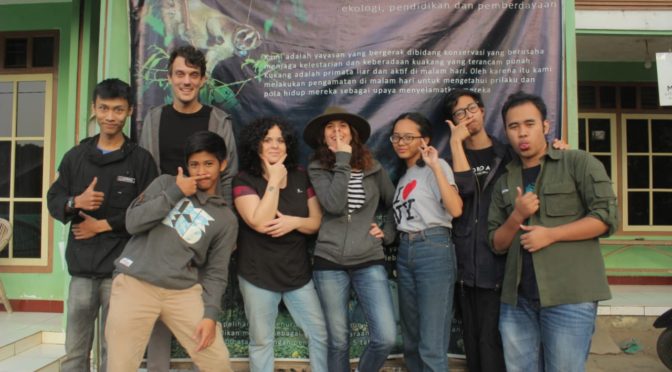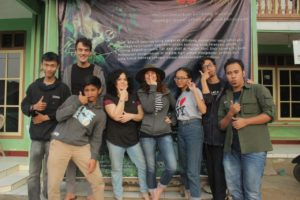Hello everyone, it’s Michela, LFP field station coordinator. My time in Cipaganti has come to an end and Sophie, the new field station coordinator is safely arrived at the field station. You will hear a lot from her in the next weeks. Welcome Sophie! In this week’s blog I would like to share with you my amazing experience at LFP!
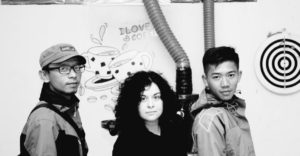
I have been the LFP field station coordinator for 9 months, this has been such an incredible and formative journey for me. I conducted most of my studies in Madagascar and this was my very first time visiting and working in Indonesia. I learned a new language (even if my Indonesian is still very basic), it has been great walking around the village and being able to do some grocery shopping and managing to have small conversations with locals. They have all been very welcoming people and on top of that I literally loved the food. I have many favourite food: martabak manis (similar to a pancake and it can be sweet or savoury, I am obsessed with the sweet one- manis means sweet in Indonesian), kue putu (a cake made of rice flour and and coloured green with extract acquired from pandan leaf and filled with brown sugar, then steamed in bamboo tubes and served with grated coconut), nasi uduk (it literally means “mixed rice”, that describes the dish preparation itself which requires many ingredients such as coconut milk, clove, lemongrass, cinnamon, and pandan leaf), and my beloved Jamur crispy (fried mushroom)
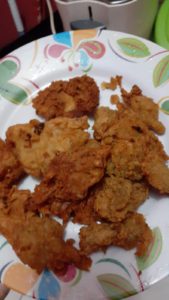
I loved living and working at the field station. The field station is called green house (Rumah Hijau in Indonesia), this house has a special place in my heart for many reasons but mostly because I met queen Miskin there.
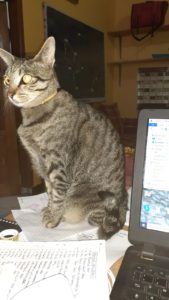
Living with the volunteers had been lovely, Indonesian students had been all very motivated and welcoming people, they cooked for all of us many times and we enjoyed free time playing the board game “Settlers of Catan” as our day-off routine).
Talking about my job, the things I loved the most were going on loris observations at night, it’s amazing to watch them, it’s a feeling I loved and had before with lemurs in Madagascar, once the animals are habituated they display their usual behavior and you feel part of them and not like an element of disturb (it’s important to keep a safe distance to them to avoid to disturb them, at least 10 m from them) even if I had some health issue lately and it was a bit difficult for me to follow them. The greater experience has been the conservation education part. I did conservation education with children in Nature Club every Saturday and then I started the “coffee curriculum” first in one high school class and then has a project in 12 secondary schools.
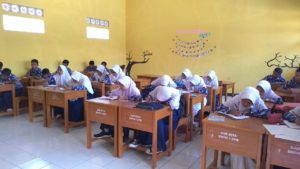
The coffee curriculum in the secondary schools was divided into 2 sessions: the first consisted of a pre-test of 5 questions related to knowledge about lorises, civets, and organic coffee. After the pre-test, me and Aconk (an LFP guide and also very talented English teacher, he is an incredible man with many skills, he is also a great photographer, I will be forever grateful to have had the chance to work and also becoming friend of him) gave 2 hours lesson related to pollination, seed-dispersing and the role of animals in coffee plantations. For example, we introduced lorises and explained their ecology and behavior. We also wanted to highlight the important role of civets in coffee plantations as seed dispersers, also that is important to keep them free, only by being free they can choose the best coffee cherries and they can also improve the quality of coffee (this was also something very new for the students in high school were we did a similar session and the things students liked the most to know).
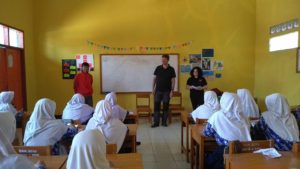
We took the first session in 10 schools and in 2 schools we did the pre-test and a basic English lesson to keep these 2 schools as control schools. The 10 schools also did a one month experiment with 2 coffee plants: they had to take care of two coffee plants and to give to them only organic fertiliser or inorganic fertiliser respectively. We also had a Whatsapp group to keep updated with the experiment. The experiment went very well and students were very enthusiastic, in most of the schools the coffee plant fed with inorganic fertiliser died, this showed to the students how difficult is to know the exact amount of chemical products to give to plants, otherwise, we can have the opposite effect.
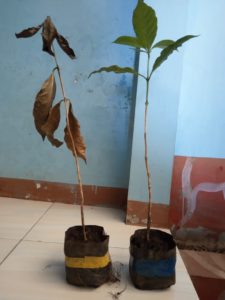
In the second session, Aconk and I went to all the schools and gave a post-test with questions related to the sessions, lorises, civets, organic coffee, etc. We then asked questions directly to the students and gave prizes to them. We are now in the process to translate the test but I hope I will share with you the results of this study soon. We also gave two different coffee to taste to their parents both organic and non-organic coffee (this was mostly an occasion for us to let the students talk about our session to their parents to share knowledge, and also to have an opinion about what Indonesians think about our organic coffee). Most of the parents didn’t really like any of them, basically, cause in Indonesia they are mostly used to coffee already prepared in sachet and sweetened which has a very different taste. The most engaged school with the coffee experiment which won the competition was MTS Al Mustofaiyah in the Sukaresmi district (stay tuned cause we will share pictures this week when the team will go to give the prize to the school!), well done!I wish to go back to LFP field station again in the next year, I hope you will hear from me again soon. This had been an amazing journey for me when I learned a lot about a new culture, places, animals etc and I also learned more about me and my skills, It is an experience I would suggest to everyone! There is lots more to say about my adventure but there is too little space to tell you everything. Thanks to all the people I worked with at LFP to make this journey unforgettable and irreplaceable! With best wishes, Michela Balestri

